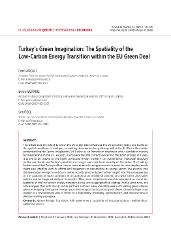| dc.contributor.author | Akcali, Emel | |
| dc.contributor.author | Gormus, Evrim | |
| dc.contributor.author | Ozel, Soli | |
| dc.date.accessioned | 2023-10-19T15:12:55Z | |
| dc.date.available | 2023-10-19T15:12:55Z | |
| dc.date.issued | 2023 | |
| dc.identifier.issn | 1304-7310 | |
| dc.identifier.issn | 1304-7175 | |
| dc.identifier.uri | https://doi.org/10.33458/uidergisi.1233968 | |
| dc.identifier.uri | 1162176 | |
| dc.identifier.uri | https://hdl.handle.net/20.500.12469/5565 | |
| dc.description.abstract | This article asks the extent to which the EU Green Deal influences the EU periphery today and builds on the spatial conditions of multiple, co-existing decarbonization pathways within the EU Green Deal while problematizing the 'green imagination' of Turkey as an immediate neighbour and a candidate country for membership in the EU. As such, it uncovers that the current low-carbon transition process in Turkey is prone to be shaped by the highly politicized energy market in an authoritarian neoliberal structure on the one hand, and Turkey's priorities in energy issues and hard security on the other. The findings further reveal that Turkey's efforts to use more domestic energy resources to meet its consumption needs might also interfere with its efforts and obligations to decarbonize its energy sector. The scrutiny into the low-carbon energy transition in Turkey accordingl contributes further insight into the consequences of the spatiality of such transitions in an authoritarian neoliberal context, and what other alternative policies can be imagined and put in practice. Thus, more empirical research is warranted to reveal the spatiality of the low-carbon energy transition across various geographical settings. At the same time, the article argues that both the EU and its partners such as Turkey should be weary of creating green utopias when redesigning their green-energy space since utopias tout court may not always stimulate large-scale change in a revolutionary way in terms of sustainability, feasibility, good practice, and inclusiveness in decision-making processes. | en_US |
| dc.description.sponsorship | Stiftung Mercator; German Federal Foreign Office; Centre for Applied T urkey Studies (CATS) at Stiftung Wissenschaft und Politik; international network of think tanks and research institutions working on Turkey | en_US |
| dc.description.sponsorship | This article was produced in the framework of the CATS Network project ?Environmental Geopolitics in the Southern Mediterranean: The Potential for Cooperation between Turkey, Egypt and Israel?, funded by Stiftung Mercator and the German Federal Foreign Office. The Centre for Applied T urkey Studies (CATS) at Stiftung Wissenschaft und Politik (SWP) in Berlin is the curator of CATS Network, an international network of think tanks and research institutions working on Turkey. | en_US |
| dc.language.iso | eng | en_US |
| dc.publisher | Uluslararasi Iliskiler Konseyi Dernegi | en_US |
| dc.relation.ispartof | Uluslararasi Iliskiler-International Relations | en_US |
| dc.rights | info:eu-repo/semantics/openAccess | en_US |
| dc.subject | Politics | En_Us |
| dc.subject | Green Energy Transition | en_US |
| dc.subject | AKP government | en_US |
| dc.subject | spatiality of decarbonization | en_US |
| dc.subject | neoliberalism | en_US |
| dc.subject | authoritarianism | en_US |
| dc.title | Turkey's Green Imagination: The Spatiality of the Low-Carbon Energy Transition within the EU Green Deal | en_US |
| dc.type | article | en_US |
| dc.identifier.startpage | 125 | en_US |
| dc.identifier.endpage | 146 | en_US |
| dc.identifier.issue | 77 | en_US |
| dc.identifier.volume | 20 | en_US |
| dc.department | N/A | en_US |
| dc.identifier.wos | WOS:000922279900001 | en_US |
| dc.identifier.doi | 10.33458/uidergisi.1233968 | en_US |
| dc.identifier.scopus | 2-s2.0-85153537706 | en_US |
| dc.institutionauthor | N/A | |
| dc.relation.publicationcategory | Makale - Uluslararası Hakemli Dergi - Kurum Öğretim Elemanı | en_US |
| dc.identifier.trdizinid | https://search.trdizin.gov.tr/yayin/detay/1162176 | en_US |
| dc.khas | 20231019-WoS | en_US |
















